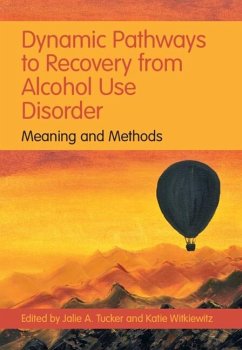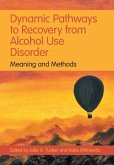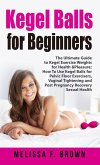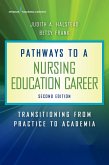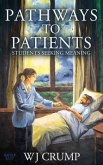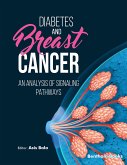Dynamic Pathways to Recovery from Alcohol Use Disorder (eBook, ePUB)
Meaning and Methods
Redaktion: Tucker, Jalie A.


Alle Infos zum eBook verschenken

Dynamic Pathways to Recovery from Alcohol Use Disorder (eBook, ePUB)
Meaning and Methods
Redaktion: Tucker, Jalie A.
- Format: ePub
- Merkliste
- Auf die Merkliste
- Bewerten Bewerten
- Teilen
- Produkt teilen
- Produkterinnerung
- Produkterinnerung

Hier können Sie sich einloggen

Bitte loggen Sie sich zunächst in Ihr Kundenkonto ein oder registrieren Sie sich bei bücher.de, um das eBook-Abo tolino select nutzen zu können.
Alcohol use disorder is by far the most prevalent substance use disorder in the general population and is a major contributor to disease worldwide. Recovery from the disorder is a dynamic process of change, and individuals take many different routes to resolve their alcohol problems and seek to achieve a life worth living. Total abstention is not the only solution and robust recovery involves more than changing drinking practices. This volume brings together multidisciplinary research on recovery processes, contexts, and outcomes as well as new ideas about the multiple pathways involved.…mehr
- Geräte: eReader
- mit Kopierschutz
- eBook Hilfe
- Größe: 7.02MB
- FamilySharing(5)
![Dynamic Pathways to Recovery from Alcohol Use Disorder (eBook, PDF) Dynamic Pathways to Recovery from Alcohol Use Disorder (eBook, PDF)]() Dynamic Pathways to Recovery from Alcohol Use Disorder (eBook, PDF)23,95 €
Dynamic Pathways to Recovery from Alcohol Use Disorder (eBook, PDF)23,95 €![Kegel Balls for Beginners: The Ultimate Guide to Kegel Exercise Weights for Health & Pleasure; How to Use Kegel Balls for Pelvic Floor Exercisers, Vaginal Tightening and Post Pregnancy Recovery (eBook, ePUB) Kegel Balls for Beginners: The Ultimate Guide to Kegel Exercise Weights for Health & Pleasure; How to Use Kegel Balls for Pelvic Floor Exercisers, Vaginal Tightening and Post Pregnancy Recovery (eBook, ePUB)]() Melissa F. BrownKegel Balls for Beginners: The Ultimate Guide to Kegel Exercise Weights for Health & Pleasure; How to Use Kegel Balls for Pelvic Floor Exercisers, Vaginal Tightening and Post Pregnancy Recovery (eBook, ePUB)2,99 €
Melissa F. BrownKegel Balls for Beginners: The Ultimate Guide to Kegel Exercise Weights for Health & Pleasure; How to Use Kegel Balls for Pelvic Floor Exercisers, Vaginal Tightening and Post Pregnancy Recovery (eBook, ePUB)2,99 €![Post-traumatic stress disorder (eBook, ePUB) Post-traumatic stress disorder (eBook, ePUB)]() Ravi KumarPost-traumatic stress disorder (eBook, ePUB)3,99 €
Ravi KumarPost-traumatic stress disorder (eBook, ePUB)3,99 €![Pathways to a Nursing Education Career (eBook, ePUB) Pathways to a Nursing Education Career (eBook, ePUB)]() Judith A. HalsteadPathways to a Nursing Education Career (eBook, ePUB)59,95 €
Judith A. HalsteadPathways to a Nursing Education Career (eBook, ePUB)59,95 €![Pathways to Patients (eBook, ePUB) Pathways to Patients (eBook, ePUB)]() Wj CrumpPathways to Patients (eBook, ePUB)8,95 €
Wj CrumpPathways to Patients (eBook, ePUB)8,95 €![Cultivating Focus: A Comprehensive Guide to Understanding and Managing Attention-Deficit/Hyperactivity Disorder (ADHD) (eBook, ePUB) Cultivating Focus: A Comprehensive Guide to Understanding and Managing Attention-Deficit/Hyperactivity Disorder (ADHD) (eBook, ePUB)]() Spineanu EugeniaCultivating Focus: A Comprehensive Guide to Understanding and Managing Attention-Deficit/Hyperactivity Disorder (ADHD) (eBook, ePUB)0,99 €
Spineanu EugeniaCultivating Focus: A Comprehensive Guide to Understanding and Managing Attention-Deficit/Hyperactivity Disorder (ADHD) (eBook, ePUB)0,99 €![Diabetes and Breast Cancer: An Analysis of Signaling Pathways (eBook, ePUB) Diabetes and Breast Cancer: An Analysis of Signaling Pathways (eBook, ePUB)]() Diabetes and Breast Cancer: An Analysis of Signaling Pathways (eBook, ePUB)45,21 €
Diabetes and Breast Cancer: An Analysis of Signaling Pathways (eBook, ePUB)45,21 €-
-
-
Dieser Download kann aus rechtlichen Gründen nur mit Rechnungsadresse in A, B, BG, CY, CZ, D, DK, EW, E, FIN, F, GR, HR, H, IRL, I, LT, L, LR, M, NL, PL, P, R, S, SLO, SK ausgeliefert werden.
- Produktdetails
- Verlag: Cambridge University Press
- Erscheinungstermin: 31. Dezember 2021
- Englisch
- ISBN-13: 9781108982818
- Artikelnr.: 66182203
- Verlag: Cambridge University Press
- Erscheinungstermin: 31. Dezember 2021
- Englisch
- ISBN-13: 9781108982818
- Artikelnr.: 66182203
- Herstellerkennzeichnung Die Herstellerinformationen sind derzeit nicht verfügbar.
perspectives on pathways to recovery from alcohol use disorder Jalie A.
Tucker and Katie Witkiewitz; Part I. Micro Level: The Individual as Change
Agent: 2. Biopsychosocial process of change in alcohol use disorder
recovery Katie Witkiewitz and Stephen A. Maisto; 3. The role of
self-regulation strategies in recovery from alcohol use disorder Corey R.
Roos, Sarah Bowen, and Hedy Kober; 4. Neuropsychological and biological
influences on drinking behavior change Marsha E. Bates, Julianne L. Price,
Jennifer F. Buckman; 5. Lifespan developmental perspectives on natural
mechanisms of cessation of risky alcohol use and recovery from alcohol use
disorder Matthew R. Lee, Yihong Zhao, Thomas Britton, Jenna Saviano, Kaan
Kideys, Yimei Li, Colin Boulter, Emery Frick, and Kenneth J. Sher; 6.
Mutual help approaches and mechanisms of change J. Scott Tonigan; 7.
Time-Varying effect modeling to examine recovery outcomes across four years
Ashley N. Linden-Carmichael, Samuel W. Stull, Christy K. Scott, and Michael
L. Dennis; 8. Latent variable mixture modeling approaches to investigating
longitudinal recovery processes JeeWon Cheong, Adam D. Wilson, and Juhan
Lee; Part II. Meso Level: Understanding and Promoting Individual Behavior
Change Within Natural Environments: 9. Natural recovery from alcohol use
disorder: Patterns, contexts, and the behavioral economics of change Jalie
A. Tucker; 10. Individual behavioral interventions to incentivize sobriety
and enrich the natural environment with appealing alternatives to drinking
James G. Murphy, Ashley A. Dennhardt, and Kathryn S. Gex; 11. Family and
social processes in recovery from alcohol use disorder Amber M. Jarnecke,
Delisa G. Brown and Alexander J. Melkonian; 12. Community-Based harm
reduction approaches for alcohol use disorder Susan E. Collins, Seema L.
Clifasefi, Grover 'Will' Williams, Lovella Black Bear and the LEAP
Community Advisory Board; 13. Use of mobile technology to understand and
improve recovery from alcohol use disorder Matthew R. Pearson, Noah N.
Emery and Frank J. Schwebel; 14. Studying recovery in social context: A
primer on methods for measuring and modeling social network data in applied
recovery research Kevin A. Hallgren; 15. Measuring substance use contexts
and substance-free reinforcement Ali M. Yurasek, Samuel F. Acuff and
Meredith S. Berry; Part III. Macro Level: Creating Environments, Resources,
Incentives, and Policies to Promote Harm Reduction and Recovery: 16.
Recovery communities: Resources and settings David Best, Charlotte
Hargreaves, Philip Hodgson, David Patton; 17. Disparities in alcohol
treatment access in rural areas: Opportunities for change Claire
Snell-Rood, Kara Bensley and Laura Schmidt; 18. Recovery, communities, and
the organized recovery movement Robert D. Ashford; 19. Alcohol control
policy and regulations to promote recovery from alcohol use disorder
William C. Kerr and Meenakshi S. Subbaraman; 20. Causal inference
approaches to studying recovery from alcohol use disorder Douglas Steinley;
21. Building on collaborative research to co-design SURE recovery, a mobile
application for people with experience of alcohol and other drug problems
Alice Bowen, Melanie Getty, Casandra Hogan, Paul Lennon, Elle Long, John
Strang, and Joanne Neale; 22. Economic methods used to evaluate recovery
programs for alcohol use disorder Brady P. Horn; Conclusions and Future
directions; 23. Dynamic pathways to recovery from alcohol use disorder:
advancing the scientific agenda and policy priorities Katie Witkiewitz and
Jalie A. Tucker; Index.
perspectives on pathways to recovery from alcohol use disorder Jalie A.
Tucker and Katie Witkiewitz; Part I. Micro Level: The Individual as Change
Agent: 2. Biopsychosocial process of change in alcohol use disorder
recovery Katie Witkiewitz and Stephen A. Maisto; 3. The role of
self-regulation strategies in recovery from alcohol use disorder Corey R.
Roos, Sarah Bowen, and Hedy Kober; 4. Neuropsychological and biological
influences on drinking behavior change Marsha E. Bates, Julianne L. Price,
Jennifer F. Buckman; 5. Lifespan developmental perspectives on natural
mechanisms of cessation of risky alcohol use and recovery from alcohol use
disorder Matthew R. Lee, Yihong Zhao, Thomas Britton, Jenna Saviano, Kaan
Kideys, Yimei Li, Colin Boulter, Emery Frick, and Kenneth J. Sher; 6.
Mutual help approaches and mechanisms of change J. Scott Tonigan; 7.
Time-Varying effect modeling to examine recovery outcomes across four years
Ashley N. Linden-Carmichael, Samuel W. Stull, Christy K. Scott, and Michael
L. Dennis; 8. Latent variable mixture modeling approaches to investigating
longitudinal recovery processes JeeWon Cheong, Adam D. Wilson, and Juhan
Lee; Part II. Meso Level: Understanding and Promoting Individual Behavior
Change Within Natural Environments: 9. Natural recovery from alcohol use
disorder: Patterns, contexts, and the behavioral economics of change Jalie
A. Tucker; 10. Individual behavioral interventions to incentivize sobriety
and enrich the natural environment with appealing alternatives to drinking
James G. Murphy, Ashley A. Dennhardt, and Kathryn S. Gex; 11. Family and
social processes in recovery from alcohol use disorder Amber M. Jarnecke,
Delisa G. Brown and Alexander J. Melkonian; 12. Community-Based harm
reduction approaches for alcohol use disorder Susan E. Collins, Seema L.
Clifasefi, Grover 'Will' Williams, Lovella Black Bear and the LEAP
Community Advisory Board; 13. Use of mobile technology to understand and
improve recovery from alcohol use disorder Matthew R. Pearson, Noah N.
Emery and Frank J. Schwebel; 14. Studying recovery in social context: A
primer on methods for measuring and modeling social network data in applied
recovery research Kevin A. Hallgren; 15. Measuring substance use contexts
and substance-free reinforcement Ali M. Yurasek, Samuel F. Acuff and
Meredith S. Berry; Part III. Macro Level: Creating Environments, Resources,
Incentives, and Policies to Promote Harm Reduction and Recovery: 16.
Recovery communities: Resources and settings David Best, Charlotte
Hargreaves, Philip Hodgson, David Patton; 17. Disparities in alcohol
treatment access in rural areas: Opportunities for change Claire
Snell-Rood, Kara Bensley and Laura Schmidt; 18. Recovery, communities, and
the organized recovery movement Robert D. Ashford; 19. Alcohol control
policy and regulations to promote recovery from alcohol use disorder
William C. Kerr and Meenakshi S. Subbaraman; 20. Causal inference
approaches to studying recovery from alcohol use disorder Douglas Steinley;
21. Building on collaborative research to co-design SURE recovery, a mobile
application for people with experience of alcohol and other drug problems
Alice Bowen, Melanie Getty, Casandra Hogan, Paul Lennon, Elle Long, John
Strang, and Joanne Neale; 22. Economic methods used to evaluate recovery
programs for alcohol use disorder Brady P. Horn; Conclusions and Future
directions; 23. Dynamic pathways to recovery from alcohol use disorder:
advancing the scientific agenda and policy priorities Katie Witkiewitz and
Jalie A. Tucker; Index.
